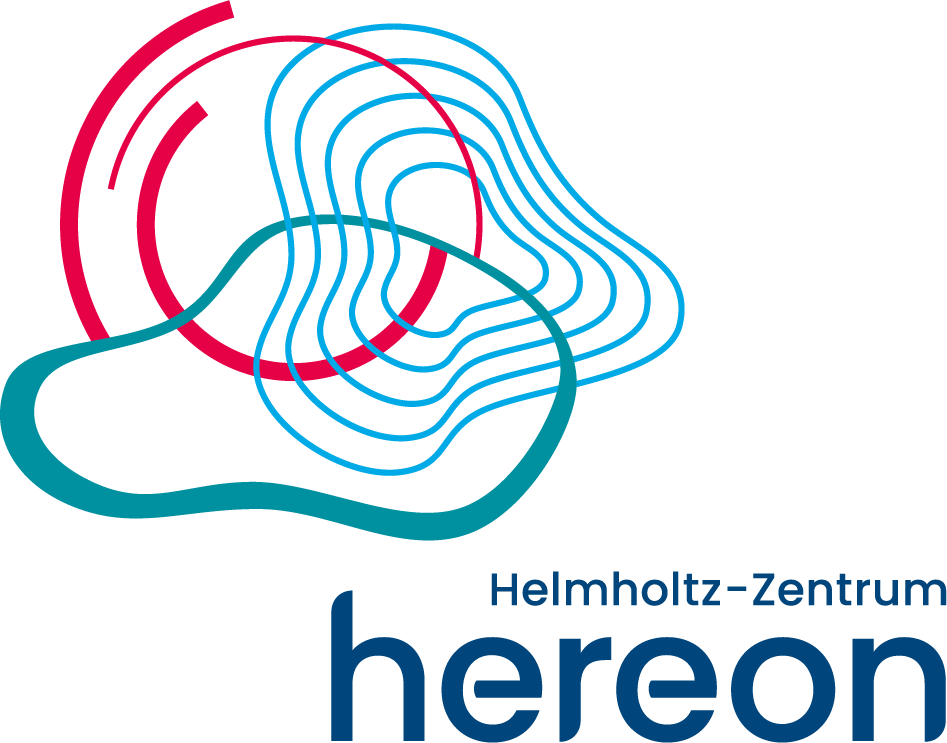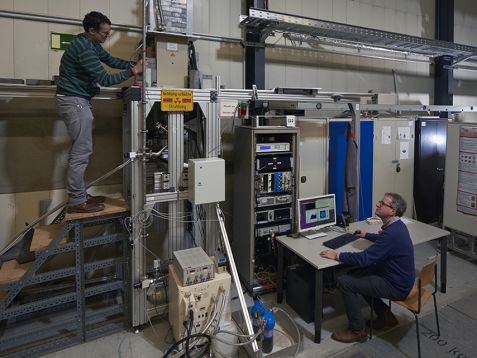MLZ is a cooperation between:
 > Technische Universität München
> Technische Universität München > Helmholtz-Zentrum Hereon
> Helmholtz-Zentrum Hereon
 > Forschungszentrum Jülich
> Forschungszentrum Jülich
MLZ is a member of:
 > LENS
> LENS > ERF-AISBL
> ERF-AISBL
MLZ on social media:

MLZ (eng)
Lichtenbergstr.1
85748 Garching
18.12.2017
8.8 million euros for the research on electronic correlations

The spectometer ACAR uses positrons. PD Dr. Christoph Hugenschmidt (r.) and his PhD student Josef Schmidbauer (l.) have built it thanks to the funding of the TRR80. © W. Schürmann / TUM
The cryptic name TRR 80 hides 21 top-class research projects shared by theoretical and experimental physicists. The Collaborative Research Center is equally supported by the University of Augsburg with spokesman Prof. Dr. Philipp Gegenwart and the Technical University of Munich with a number of professors of the Physics Department. Other partners include the Max Planck Institute for Solid State Research in Stuttgart, the University of Duisburg-Essen and the Walther Meißner Institute. “During the review of the transregio for this funding period, the panel stated that we have great potential because of the direct involvement of the FRM II with its neutrons and positrons,” says Dr. Michael Leitner.
Looking at disorder
Leitner leads one of the subprojects that deals with so-called Heusler alloys. For example, the coupling of the magnetic and structural degrees of freedom in these materials allows them to be used in refrigeration-free refrigerators. So far, Michael Leitner has been studying with a doctoral student on the instruments SPODI and SANS-1 how the arrangement of the atoms affects the magnetic order. “We already know how perfectly ordered systems behave. But this is not realistic for the application, because there is always disorder, “explains Michael Leitner, who is employed at the FRM II and working towards his habilitation with Prof. Dr. Peter Böni. “Therefore, we now look at how the disorder affects the magnetic moments of the atoms.”
*
Positrons examine new materials*
In another project, PD Dr. Christoph Hugenschmidt and his PhD student Josef Schmidbauer from the chair E21 of the TUM physics department study the electronic structure of materials – using positrons instead of neutrons. For this purpose they use their own compact positron source on their new spectrometer, which they set up at the MLL accelerator laboratory during the first funding period of the TRR80. The apparatus offers the great advantage of being able to measure the electronic structure in the bulk of solids, both temperature-dependent and spin-resolved. They take advantage of the fact that the positrons, as antiparticles of the electrons, all have a spin polarization in the flight direction. When an external magnetic field is applied to the sample, the positrons annihilate with their counterparts, the electrons, preferably when their spins point in opposite directions. The annihilation of both particles produces characteristic gamma radiation, which provides valuable information about electronic correlations and thus the fundamental understanding of magnetic phenomena in new materials.
Three further projects, which will be funded until 2021, use neutrons at the Heinz Maier-Leibnitz Zentrum. Dr. Astrid Schneidewind from Forschungszentrum Jülich and Prof. Dr. Christian Pfleiderer from the TUM physics department E 51 investigate how magnetic order can be stabilized under extremely high pressure. Dr. Thomas Keller and Prof. Dr. Bernhard Keimer from the Max Planck Institute for Solid State Research focus on the lifetime of magnetic excitations, and Prof. Dr. Manfred Albrecht from the University of Augsburg is studying together with Prof. Dr. Peter Böni the magnetic order in thin layers by means of neutron reflectometry.
Funding for young scientists
Young scientists will mainly benefit from the funding of the TRR80. In the 21 sub-projects, 32 doctoral students will conduct research and present their results with the help of the funding at national and international conferences. As part of a so-called “Integrated Research Training Group”, junior researchers can independently work on smaller projects and organize workshops and summer schools. Various soft skills courses complete the offer.
More nformation:
Homepage of the collaborative research center TRR80
MLZ is a cooperation between:
 > Technische Universität München
> Technische Universität München > Helmholtz-Zentrum Hereon
> Helmholtz-Zentrum Hereon
 > Forschungszentrum Jülich
> Forschungszentrum Jülich
MLZ is a member of:
 > LENS
> LENS > ERF-AISBL
> ERF-AISBL
MLZ on social media:


